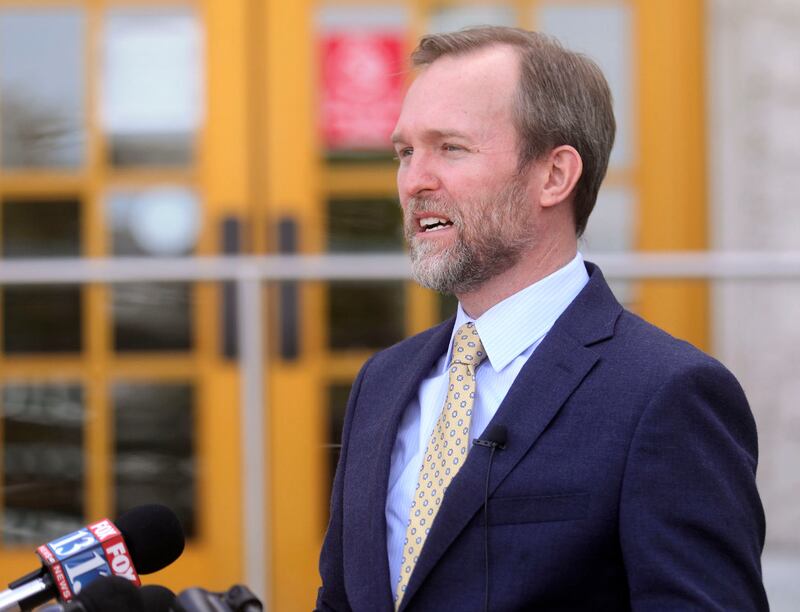It’s on every Utah political junkie’s mind: What does the Utah Democratic Party’s move to back Evan McMullin and not its own U.S. Senate nominee actually mean for the party?
Are Democrats in Utah so irrelevant that this is what it’s come to?
McMullin and his supporters say the vote backing him was about more than the political affiliation — it’s about putting “country over party.” But just how much have Utah Democrats sacrificed, and how will it impact the party’s future fundraising and down-ballot candidates?
Answers depend on who you talk to.
‘Clearly a sign of weakness’
Democratic delegates’ 57% to 43% vote to join the independent Evan McMullin coalition in the bid to unseat GOP Sen. Mike Lee was indeed unprecedented and “extraordinary,” said Matthew Burbank, political science professor at the University of Utah.
But it also wasn’t a “great look” for the party — and could have lasting negative impacts, he said.
Does it mean the party’s so irrelevant in Utah, it’s dead? No, Burbank said. But it is an admission of “weakness.”
“It’s essentially conceding that you have no hope,” he said. “It’s clearly a sign of the weakness of the Democratic Party.”
While Burbank said he understands the “tactical” move to split the “anti-Lee vote,” he said it’s “a little bit striking for the Democratic Party essentially to concede, ‘We can’t win this election anyway, so we might as well go with an independent.’”

While, yes, this ups the chances of beating Lee, Burbank said, “the reality is McMullin still has a pretty steep hill to climb” as an independent running against a Republican incumbent in an overwhelmingly Republican state. With multiple Republican candidates.
“All they can really hope is the primary for the Republicans exposes some weaknesses for Lee,” Burbank said. “But again, is all that going to happen? I don’t know.”
So what does this all mean for the Utah Democratic Party’s future?
If McMullin wins, “then perhaps it doesn’t look like a terrible decision,” Burbank said. “They’ll frame it as country over party, but really this is a tactical (move that shows) ‘We dislike Mike Lee so much that we’re willing to support another Republican who doesn’t seem quite as bad.’”
If Lee wins?
“Then, of course, it just looks like Democrats are weak, and they’re so weak they couldn’t put up a candidate, and when they tried to do something tactical, they still lost,” Burbank said. “I think that’s the kind of worst-case scenario here.”
Burbank questioned whether this move was a “viable long-term strategy” for Utah Democrats to “make themselves more relevant.” Even if McMullin beats Lee, “still you’ve got a relatively conservative Republican, an independent who may well become a Republican again in the future.”
“You might get rid of Mike Lee,” he said. “But have you made yourself better off as a result of that? I struggle to see how.”
The “bigger problem,” he said, isn’t just about Utah’s U.S. Senate seat.
“If you’re somebody who’s given money to the party, and you’re looking at this saying, ‘OK I’ve been trying to support you, I’ve been trying to make the argument for why the Democrats need to have a strong presence, and now you’re telling me McMullin is a better choice than a Democrat would be?’”
“I think it makes it hard to go back to those people who contributed ... and say to them, ‘Here’s why we need more of your money.’”
It’s “entirely possible” the McMullin decision could impact the party’s future fundraising, Burbank said, especially if it frustrates large funders. “That could be a serious blow.”
A ‘shrewd’ move
Another pundit — from the national arena — has a differing viewpoint. Journalist Walter Shapiro is a fellow at the Brennan Center for Justice at New York University and a lecturer in political science at Yale who has covered the past 11 presidential campaigns.
Shapiro recently wrote in an opinion piece for Roll Call that Utah Democrats’ move to back McMullin “may have looked like a surrender,” but was actually a “shrewd decision.” He called it the most “intriguing political development” in recent weeks that “can serve as a model for a big-tent crusade to preserve democracy during this time of deep fissures in our republic.”
Shapiro wrote that Utah has “never been a Trump state,” with McMullin himself receiving 22% of the Utah vote, even as an independent, when he ran against Trump in 2016. Even though the road ahead for McMullin is “daunting,” he said Utah Democrats’ strategy is “sound,” especially as Lee faces fallout for his texts to Mark Meadows, Trump’s chief of staff.
“In one-party Republican states, the best possible approach is to make common cause with conservatives and moderates who uphold democratic values and reject Trump’s destructive fantasies about a stolen election,” Shapiro wrote.
In a “bitterly divided nation,” he said “politics should be about what is possible rather than what is theoretically perfect.”
“That’s why someday, when the Trumpian nightmare is history, they will hang a plaque for pragmatism on the walls of Cottonwood High School in Murray, Utah,” he wrote, referring to the party’s convention venue.
Will the Utah Republican Party ‘capitalize’ on this?
On the other hand, Carson Jorgensen, chairman of the Utah Republican Party, sees the McMullin endorsement as nothing but good news for the Utah GOP.
“I think it’s going to be absolutely detrimental to them in the future, because they just told their entire base that, ‘Hey, we don’t have anybody good enough, so we’re going to have to go shopping elsewhere.’”
Jorgensen said he understands a “numbers game is a numbers game,” and if Utah Democrats decided they didn’t have a path to win the Senate race, that’s one issue.
“But at the end of the day, you have to have people that believe in something,” he said, calling the move “shortsighted. They’re not playing the long game. I don’t think they believe that they have a future here.”
Jorgensen said the McMullin coalition isn’t making Utah Republicans nervous at all. On the contrary, he said, “It honestly energizes the (GOP) base even more.”
“Now our base is energized, and they just took all the air out of the Democrats’ sails.”
Pulling their own Senate nominee won’t encourage Democratic voters to turn out for all the other Democratic down-ballot races, Jorgensen said, “because now they don’t have a candidate high on the ticket.”
“In an effort to win one race, you just sacrificed your party,” he said. “And we’re going to capitalize on it.”
Jeff Merchant, the Utah Democratic Party’s past chairman who served as the convention chairman on Saturday, fumed at Jorgensen’s comment. If Utah Democrats are “sacrificing themselves,” he said, it’s for “the betterment of this country.”
“I would argue that every Democrat I know would gladly do that to see our democracy continue to move forward,” Merchant said. “And that is a big difference between what Democrats are willing to do and what Republicans need to be willing to do.”
Merchant said he has heard “a lot of people saying that this is somehow a death knell to the party, and I really would disagree with that.”
Yes, Merchant said, as a Democrat, it was “heartbreaking” to see the Utah Democratic Party opt against nominating a U.S. Senate candidate, but at the same time, he said, a majority of the party’s delegates are also “realizing there may be bigger things at stake than just party reputation.”
“I actually am more optimistic about the party as a whole than I have been in a really long time,” Merchant added, “while at the same time being very, very fearful for the future of our country.”
Only one way up from rock bottom
Former Democratic Congressman Ben McAdams, who is one of the leaders of the party’s pro-McMullin faction, believes in the “country over party” movement.

And, McAdams said, he believes the McMullin coalition will actually “energize” Utah Democrats in a way they haven’t been in a long time — especially after this year’s “gerrymandered” redistricting process, which he said has left “most races out of reach and unwinnable.”
“The Utah Democratic Party is at an all-time low right now,” he said. “We hold the fewest number of legislative seats than we’ve held in a long time and with redistricting, seem poised to lose even more seats.”
Utah is only about 15% registered Democrat, compared to about 50% registered Republicans and about 30% unaffiliated voters, according to voter registration statistics posted on the state’s election website. In statewide races, Democrats are already “often ignored,” McAdams said.
So now, McAdams said it’s “time for us to try something new.”
“In Utah, if the Utah Democratic Party wants to be relevant in major elections, we’ve got to build bigger coalitions than the ones we have right now,” McAdams added. “It’s time for us to take a serious look at what it’s going to take for Utah Democrats to be relevant in the eyes of voters, because in many ways we’re not relevant right now.
“By joining Evan McMullin’s coalition, Utah Democrats’ voices will be relevant in a statewide race for the first time in a decade,” he said.
In light of redistricting — and the Utah Republican Party’s convention Saturday — “Utah seems to be taking a lurch to the right, and many voters are finding themselves politically homeless,” he said.
By joining the McMullin coalition, McAdams said Utah Democrats made a choice to prioritize stopping “this dangerous, far-right extremism that has permeated the Republican Party.”
“We’re building a sensible coalition of people who care more about this country than they do about party loyalty,” he said. “What you’re seeing here is a majority of Utahns — who are moderate and just want sensible, mainstream solutions to the challenges we’re facing — are banding together to do what’s right for the country.”
To McAdams, the McMullin vote indicates the Utah Democratic Party’s future is one that’s more “centrist.”
“This presents an opportunity for Utah Democrats to move to the center and to become relevant,” McAdams said.
“You know, I’ve always been somebody who believes in putting people before party. And I think that’s the loud message that came out of the Utah Democratic Party, that we care about this country and the values of democracy more than we care about partisanship.”
Burbank, however, questioned whether a “centrist” movement within the Utah Democratic Party will find success in Utah. He noted McAdams’ position can be seen as a “little self-serving,” since he’s run before as more of a centrist candidate, and “there is no real indication that there’s a payoff there for Democrats.”
“The reality, unfortunately, is that Democrats — other than McAdams — they don’t really have candidates that look really strong in that category. McAdams did OK in one election, but, you know, couldn’t hold the position even as an incumbent,” Burbank said, referring to McAdams’ loss in the 4th Congressional race against Burgess Owens in 2020.
What’s happened to the party since the McMullin vote?
The Utah Democratic Party’s newly elected chairwoman, Diane Lewis, bristled at any commentary that the party is “dead” or “weak.”
“We’re alive and well,” she said. “We’re still here, so watch out.”
The McMullin decision was “unprecedented,” so it’s hard to predict exactly what’s going to happen in its wake, she said. “In November, we’ll see. ... If it works, we’re going to be really excited about it. If it doesn’t, of course we’re going to be very disappointed.”
However, with a clear majority of delegates making this decision, Lewis said she doesn’t think it will widely demoralize delegates and other Utah Democrats.
Asked what her personal viewpoint was on the issue, Lewis said as party chairwoman, she takes the position of “whatever those delegates decide. ... So my personal views aren’t important.”
Overall, “delegates chose” to go this route, she said. “That’s our democratic process.”
Lewis, however, did say a handful of delegates have resigned their positions out of frustration. “What I’ve seen personally is about five or six,” she said. “That doesn’t surprise me because I had heard from some that if this happened that they would do that.”
Asked if any major recurring donors had canceled their contributions, Lewis told the Deseret News the party had, as of this week, seen “maybe one recurring donor (cancel), but it wasn’t a big donor.”
In contrast, Lewis said she had just gotten off a phone call in which “I got a lot of good feedback from people excited about the movement forward.”
Delegates supporting Kael Weston urged their fellow Democrats during Saturday’s convention to “stay united,” to “stay true” to the party and put a Democrat on the ballot. Many talked about feeling disenfranchised as a Democratic voter by opting against a Senate nominee.

As for those delegates who are still frustrated with the decision, Lewis said party officials are encouraging them to “look to the future” and coalesce around all the other candidates the Democratic party is backing in crucial races. She pointed specifically to the four other Congressional races, and “all the way down” the ballot.
“Don’t leave them. We can’t leave them,” she said. “They’re an important role in our party.”
Merchant said over the past two to three years he’s seen an “upsurge in interest” for the Utah Democratic Party, and today the party is “still fairly strong” with “good, strong” candidates lined up for all the other major offices.
“There’s still plenty of money that’s coming into the party,” he said.
But is there concern that the Utah Democratic Party might lose some of its most hardcore, loyal supporters over the McMullin vote?
“Sure, there are going to be people that are going to leave over something like this. That happens anytime there’s something controversial,” Merchant said. “And, of course, in my mind it’s a problem whenever we lose anyone. But we’re not going to make everybody happy all the time.”
At the end of the day, the McMullin vote passed by a decent margin, Merchant said. “It is the party that has decided to do this.”
Yes, there were “plenty of delegates that hated that choice,” Merchant added. “There was a part of me that was one of those delegates.”
“But at the same time, if we win, that’s a coup for everyone. And if we lose, I don’t know if we’re any worse off than we were before.”


 alt=Katie McKellar
alt=Katie McKellar